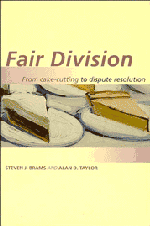Book contents
- Frontmatter
- Contents
- List of figures
- List of tables
- Acknowledgments
- Introduction
- 1 Proportionality for n = 2
- 2 Proportionality for n > 2: the divisible case
- 3 Proportionality for n > 2: the indivisible case
- 4 Envy-freeness and equitability for n = 2
- 5 Applications of the point-allocation procedures
- 6 Envy-free procedures for n = 3 and n = 4
- 7 Envy-free procedures for arbitrary n
- 8 Divide-the-dollar
- 9 Fair division by auctions
- 10 Fair division by elections
- 11 Conclusions
- Glossary
- Bibliography
- Index
8 - Divide-the-dollar
Published online by Cambridge University Press: 05 July 2011
- Frontmatter
- Contents
- List of figures
- List of tables
- Acknowledgments
- Introduction
- 1 Proportionality for n = 2
- 2 Proportionality for n > 2: the divisible case
- 3 Proportionality for n > 2: the indivisible case
- 4 Envy-freeness and equitability for n = 2
- 5 Applications of the point-allocation procedures
- 6 Envy-free procedures for n = 3 and n = 4
- 7 Envy-free procedures for arbitrary n
- 8 Divide-the-dollar
- 9 Fair division by auctions
- 10 Fair division by elections
- 11 Conclusions
- Glossary
- Bibliography
- Index
Summary
Introduction
Much work in the mathematical social sciences is devoted to showing the conditions under which individually rational actions can lead to collectively inferior outcomes (Kim, Roush, and Intriligator, 1992). This problem is epitomized by the game of “Prisoners’ Dilemma” (Brams, 1985a; Taylor, 1995), in which each player has a dominant, or unconditionally best, strategy of not cooperating, but the resulting outcome, and unique Nash equilibrium, is worse for both players than if they had both cooperated.
This clash between individual and collective interests is also illustrated by the game of divide-the-dollar (DD), wherein two players, Bob and Carol, independently propose a division of a dollar into cents, with each demanding a certain amount. Since we assume that Bob and Carol value the dollar, and parts of it, in the same way, the question is not how to carve out equal portions of it but, rather, how to induce them to do so on their own, with minimal sanctions for not being egalitarian (i.e., bidding 50 cents each). We stress “minimal,” because we want egalitarian behavior, or something close to it, to emerge as a consequence of the players' rational calculations, not be imposed by an outside party or be the product of dire threats.
Thus, our search for procedures that result in allocations that players can implement themselves continues, but in a context in which the players are not faced with the problem of discovering a nonobvious allocation.
- Type
- Chapter
- Information
- Fair DivisionFrom Cake-Cutting to Dispute Resolution, pp. 158 - 177Publisher: Cambridge University PressPrint publication year: 1996



